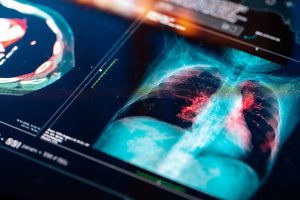
How Breast Density Affects Your Breast Cancer Risk
If you have dense breast tissue listed on your mammogram results, you may be wondering what it means. What makes some breasts denser than others,
HIPAA Alert: Potential Data Breach Learn More
Questions on Oncology, Hematology and/or Infusion Clinical Services due to COVID-19 Crisis – CALL 833-698-1623
Important Information for Our Patients Regarding the Coronavirus.
RCCA Providing Area Cancer Patients with Access to Care During Coronavirus Outbreak
RCCA Offering Patients Virtual Visits During Coronavirus Pandemic
Prostatic acinar adenocarcinoma is the most common form of prostate cancer, which makes it one of the best understood types of the disease. Patients with this prostate cancer type have a strong chance of successful treatment if their condition is detected early.
Regional Cancer Care Associates (RCCA) treats a variety of cancer types, including breast, lung, colon, and prostate cancers, in addition to a range of malignant and benign blood disorders. We are an authority on cancer care in New Jersey, Connecticut, Massachusetts, and the Washington, D.C., area. With more than 20 locations throughout the region, we allow patients to receive cutting-edge care close to home.
Prostatic acinar adenocarcinoma is a form of prostate cancer that forms in the epithelial (protective) cells found in glandular tissue. Acinar adenocarcinoma develops in the gland itself, differentiating it from prostatic ductal adenocarcinoma, which develops in the ducts.
Like other types of cancer, prostate cancer is caused by abnormal cell growth. Under normal conditions, cells reproduce at a consistent rate. Occasionally, however, a mutation alters the molecular instructions that tell cells when to divide. The mutated cells multiply much more quickly than normal. This creates a mass of abnormal cells, or a tumor, that grows and may spread to healthy tissue. The spread is what makes cancer dangerous.
Prostate cancer is among the most common types of cancer affecting men. About one in eight, or 12%, of men will develop prostate cancer at some point in their lives. This makes it second only to skin cancer in terms of cancers diagnosed in men. Almost all new cases are prostatic acinar adenocarcinoma. It is currently estimated that adenocarcinomas account for more than 95% of all prostate cancer cases. Of these, about 90% are prostatic acinar adenocarcinoma.

Cancer is progressive, meaning symptoms get worse over time. Prostate cancer stages are used to describe the progress of the disease. Staging is based on the size of the tumor, how far it has spread, and how much it has increased prostate-specific antigen (PSA) levels in the blood. In summary:
As with other cancers, survival rates are best in the early stages of the disease. Nearly 100% of patients with Stage I, II, and III prostate cancer will survive for at least five years, with most surviving much longer. In Stage IV disease, however, the five-year relative survival rate decreases to 30%. This is why early diagnosis of prostatic acinar adenocarcinoma is so important.
Prostatic acinar adenocarcinoma does not always cause symptoms in its early stages. As the cancer develops, however, the growing tumor may interfere with normal prostate function. It may also place pressure on the urinary duct. This can result in the following symptoms:
Late-stage prostatic acinar adenocarcinoma may cause symptoms in other parts of the body as cancer cells spread. Patients may experience bone pain, nerve dysfunction, fatigue, and loss of appetite.
Due to the lack of symptoms, early-stage prostate cancer can be difficult to identify. Most cases are detected with routine prostate-specific antigen (PSA) screening. After screening detects an abnormality, a urologist or medical oncologist typically will follow these steps to confirm a diagnosis:
A digital rectal exam (DRE) involves the physician inserting a gloved, lubricated finger into the rectum. The doctor will feel for lumps or hard masses that could indicate a tumor. While a DRE can assist in detecting later-stage cancer, physicians cannot always feel prostatic acinar adenocarcinoma in its early stages.
The oncology team may request an X-ray, computed tomography (CT) scan, magnetic resonance imaging (MRI) scan, or ultrasound. Imaging tests allow a closer look at internal bodily structures and can be used to check for tumors, abnormal tissue, and other signs of prostatic acinar adenocarcinoma.
Almost all diagnoses are confirmed with a prostate biopsy. For this test, physicians use a hollow needle to remove a small tissue sample. The sample is examined under a microscope to determine whether it contains cancerous cells, how many there are, and how likely they are to respond to certain treatments.
Active surveillance, also called watchful waiting, is an approach urologists and oncologists sometimes take for early-stage, non-aggressive prostate cancer. It involves simply monitoring the cancer to ensure it does not grow. This treatment plan is most often recommended for tumors are not causing health problems. It may also be recommended for elderly patients or those with other health issues.
The RCCA team works closely with a patient and his other physicians to identify and implement the best approach for that person. Specialists consider a variety of factors to develop a personalized treatment plan, prioritizing targeted therapies whenever possible. Options include:
Patients with prostatic acinar adenocarcinoma can find comprehensive care at Regional Cancer Care Associates. Our medical oncologists and hematologists treat all kinds of cancer and blood disorders at more than 20 locations near you in New Jersey, Connecticut, Massachusetts, and the Washington, D.C., area, enabling patients to receive care close to home. Contact us to learn more or schedule a consultation with a medical oncologist.
What is prostatic acinar adenocarcinoma?
Prostatic acinar adenocarcinoma is the most common form of prostate cancer. It develops in the epithelial tissue of the prostate gland. Cancer is characterized by abnormal, out-of-control cell growth.
What are the signs of prostatic acinar adenocarcinoma?
Prostate cancer often does not cause symptoms in the early stages. In later stages, it may cause problems with urination and sexual activity.
How is prostate cancer detected?
Most cases of prostatic acinar adenocarcinoma are detected with a prostate-specific antigen (PSA) blood test. After screening detects an abnormality, the diagnosis is confirmed with a digital rectal examination (DRE), medical imaging, and a prostate biopsy.
What are the risk factors for prostate cancer?
The major risk factors for prostate cancer include age, African-American or Caribbean racial heritage, and a family history of prostate cancer.
What are treatment options for prostate cancer?
The best prostate cancer treatment depends on the cancer stage and the patient’s overall health. Options offered by RCCA include active surveillance hormone therapy, immunotherapy, and chemotherapy. RCCA also provides patients with access to clinical trials and coordinates closely with patients’ surgeons and radiation oncologists.
By classifying the stage of a patient’s cancer, health care providers are better equipped to form an appropriate treatment plan. If you or your loved one suspect symptoms of bladder cancer, one of our expert oncologists at Regional Cancer Care Associates can evaluate your symptoms, provide a diagnosis, and offer treatment. Schedule an appointment or learn more about bladder cancer stages by contacting us today.

If you have dense breast tissue listed on your mammogram results, you may be wondering what it means. What makes some breasts denser than others,

If an individual is experiencing symptoms of lung cancer or an infection, the next step is a lung biopsy. This step can sound worrisome at

Patients receiving treatment from Regional Cancer Care Associates in Moorestown are in good hands. Five of its physicians — Dr. Seth Berk, Dr. Maurice Cairoli, Dr.

Regional Cancer Care Associates is one of fewer than 200 medical practices in the country selected to participate in the Oncology Care Model (OCM); a recent Medicare initiative aimed at improving care coordination and access to and quality of care for Medicare beneficiaries undergoing chemotherapy treatment.